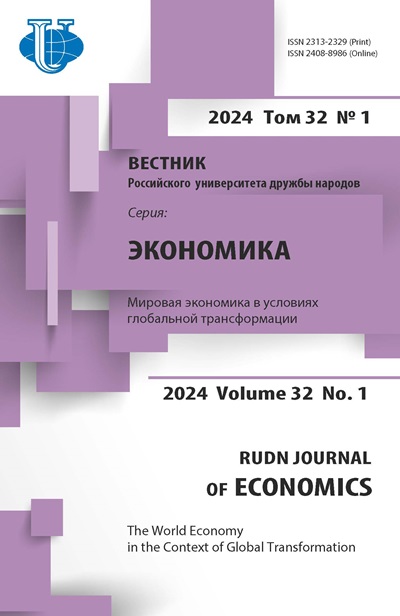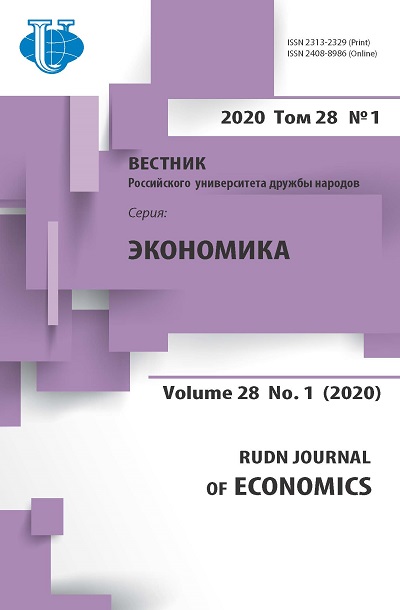Theoretical bases of managing agricultural production based on digital technologies
- Authors: Shelkovnikov S.A.1, Petukhova M.S.1, Alekseev A.A.1
-
Affiliations:
- Novosibirsk State Agrarian University
- Issue: Vol 28, No 1 (2020)
- Pages: 137-145
- Section: ECONOMIC GROWTH AND SOCIO-ECONOMIC DEVELOPMENT
- URL: https://journals.rudn.ru/economics/article/view/23499
- DOI: https://doi.org/10.22363/2313-2329-2020-28-1-137-145
Cite item
Full Text
Abstract
Digitalization affects all sectors of the economy, including agriculture. In addition, agriculture is a sector where the flow of data is very large and their digitization becomes a necessity for making optimal management decisions. The use of digital technologies in the industry is aimed at automating the maximum number of agricultural processes by creating a virtual model of the entire production cycle, and planning and forecasting with a high level of accuracy the schedule of work, crop yields, production costs and profits. Thus, digital technologies significantly change the process of managerial decision-making by the head of an agricultural organization. The purpose of this study is to develop the theoretical foundations of digital agricultural production management. The research methodology was based on monographic, abstract-logical, comparative methods. The study revealed that digitalization of agricultural production requires not only a complete change in production technology, but also a management system. A number of specific features inherent in the management of digital agricultural production are highlighted, which relate to the emergence of possibilities for modeling the production process, making changes to it and developing different scenarios; reducing the degree of influence on the production results of the climatic and human factors; guaranteed receipt of specified production parameters and the dependence of the vital activity of organisms on the work of engineering systems. In the context of digitalization of production, the functions of managing an organization undergo changes: in the framework of planning, which is generally carried out by a person, a significant role is given to forecasting, or rather, the development of scenarios for the possible development of production, which is already carried out by artificial intelligence. The latter also passes the function of monitoring production.
About the authors
Sergey A. Shelkovnikov
Novosibirsk State Agrarian University
Author for correspondence.
Email: shelkovnikov1@rambler.ru
Doctor of Economics, Professor, Head of the Department of Finance and Statistics
160 Dobrolubova St., Novosibirsk, 630039, Russian FederationMarina S. Petukhova
Novosibirsk State Agrarian University
Email: russian_basket11@mail.ru
Candidate of Economic Sciences, leading researcher of the Branch Center for Forecasting and Monitoring of Scientific and Technological Development of Agriculture
160 Dobrolubova St., Novosibirsk, 630039, Russian FederationAndrey A. Alekseev
Novosibirsk State Agrarian University
Email: shelkovnikov1@rambler.ru
post-graduate student
160 Dobrolubova St., Novosibirsk, 630039, Russian FederationReferences
- Afonina, E.V. (2018). Perspektivy realizacii koncepcii “Industriya 4.0” v otechestvennoj promyshlennosti [Prospects for the implementation of the concept “Industry 4.0” in the domestic industry]. Drukerovskij vestnik, (1), 173–182. (In Russ.)
- Bras, B. (2009) Sustainability and product life cycle management issues. International Journal of Product Lifecycle Management, 4(1–3), 23–48.
- Cedeno, J.M.V., Papinniemi, J., Hannola, L., & Donoghue, I. (2018). Developing smart services by internet of things in manufacturing business. Logforum, 14(1), 59–71.
- Chulov, D.V. (2004). Upravlenie sel'skohozyajstvennym proizvodstvom na osnove novyh informacionnyh tekhnologij [Management of agricultural production based on new information technologies]. Bryansk. (In Russ.)
- Espolov, T. (2018). Cifrovizaciya APK – trebovanie novogo vremeni [Digitalization of agriculture – a requirement of the new time]. Retrieved from https://ru.kyzylorda-news.kz/ news/lifnews/19306 (In Russ.)
- Evert, F.K., Fountas, S., Jakovetic, D. et al. (2017). Big Data for weed control and crop protection. Weed Research, 57(4), 218–233.
- Kravchenko, R.P., & Krylatyh, E.N. (1975). Avtomatizirovannaya sistema upravleniya v sel'skom hozyajstve [Automated management system in agriculture]. Moscow. (In Russ.)
- Luk'yanov, B.V., Poshataev, A.V., & Rak, N.G. (1995). Novye informacionnye tekhnologii v upravlenii sel'skohozyajstvennym proizvodstvom [New information technologies in agricultural production management]. Moscow: MSKHA Publ. (In Russ.)
- Martynenko, E.V. (2015). Problemy ispol'zovaniya novyh informacionnyh tekhnologij v upravlenii sel'skohozyajstvennym predpriyatiem [Problems of using new information technologies in agricultural enterprise management]. Novye tekhnologii, (3), 50. (In Russ.)
- Sandu, I., Ryzhenkova, N., Afonina, V., & Doshchanova, A. (2018) Cifrovizaciya kak instrument innovacionnogo razvitiya APK [Digitalization as a tool for innovative development of agriculture]. APK: ekonomika, upravlenie, (8), 12–19. (In Russ.)
- Serazetdinova, L., Garratt, J., Baylis, A., Stergiadis, S., Collison, M., & Davis, S. (2019). How should we turn data into decisions in AgriFood? Journal of the science of food and agriculture, 99(7), 3213–3219.
- Shafikov, T.A. (2018). Ocenka vozmozhnostej vnedreniya elementov cifrovogo sel'skogo hozyajstva v regione (na primere Respubliki Bashkortostan) [Assessment of the possibilities of introducing elements of digital agriculture in the region (on the example of the Republic of Bashkortostan)]. Nauchnye zapiski molodyh issledovatelej, (2), 48. (In Russ.)
- Shelkovnikov, S.A., Alekseev, A.A., Petukhova, M.S., & Essaulenko, D.V. (2019). Konceptual'nye osnovy upravleniya “umnymi” teplicami [Conceptual framework for the management of “smart” greenhouses]. Ekonomika i predprinimatel'stvo, (1), 720–723. (In Russ.)
- Shiyan, I. (2017). Chto poseem, ili cifrovizaciya sel'skogo hozyajstva [What we sow, or digitalization of agriculture]. Direktor informacionnoj sluzhby, (9), 125–128.
- Wolfert, S., Ge, L., Verdouw, C. et al. (2017). Big Data in Smart Farming – A review. Agricultural systems, 153, 69–80.















